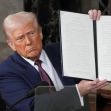Two lawsuits accused President Trump of violating the emoluments clauses of the Constitution by making profits from his New York and Washington hotels and restaurants. Monday, the Supreme Court declined to hear Trump’s request to consider the lower-court orders. Those orders had said the lawsuits could go forward on the rulings against Trump.
However, the Supreme Court issued orders wiping out the rulings against Trump, ordering lower courts to dismiss the cases and declaring them moot since he is no longer president. No dissents were noted. There was no fanfare; the action was announced as part of a routine orders list issued by the court Monday morning.
“Today’s orders suggest that the court is increasingly willing to invoke this doctrine to avoid highly charged political disputes, even if the mootness wasn’t caused by the parties that won below,” said Steve Vladeck, a CNN Supreme Court analyst and professor at the University of Texas School of Law.
Walter Shaub, former Office of Government Ethics chief, said in a tweet that the Supreme Court’s decision was “insane,” and that the cases were NOT moot. “(Trump) still has the money. When any other federal employee violates the emoluments clause they have to forfeit the money.”
This outcome shows the courts to be an ineffective method for policing Trump’s alleged violations of the clauses. After three years and more in the courts, neither case had yet reached the fact-finding stage of litigation.
This “moot and dismiss” result means no definitive Supreme Court ruling on the Constitutional emolument provisions exist.
“Emolument” means “compensation for services or labor.” In one of the provisions of the Constitution, the domestic emoluments clause, the president is barred from receiving “any other emolument” from the federal government or the states besides his official compensation.
The second provision, the foreign emoluments clause, prevents anyone holding a federal “office of profit or trust” from accepting any “present, emolument, office, or title, of any kind whatever, from any king, prince, or foreign state” without Congress’s consent.
The two cases were brought in Virginia and New York. Both ruled against Trump on the preliminary issues of whether the plaintiffs had standing to sue the president. High-end hotels and restaurants in both locations “found themselves in the unenviable position of having to compete with businesses owned by the President of the United States.” The suits tried to obtain financial records showing how much foreign and state governments have paid the Trump Organization on his properties while he was president.
The Virginia case was brought by Maryland and the District of Columbia. A joint statement made by Brian E. Frosh, Maryland’s attorney general, and Karl A. Racine, the District of Columbia’s attorney general, alleged “President Trump illegally profited from his office by receiving improper emoluments in the form of money from foreign governments, federal agencies and state governments that conducted business at his hotel to curry favor with him and his administration.” It further said “History will note that at every step of this case, President Trump and political appointees at the Department of Justice went to extreme lengths to prevent us from uncovering the true extent of his corruption. He attempted to short-circuit the rules of legal procedure to have our case dismissed and avoid discovery into his finances, arguing that the law did not apply to him.”
Racine and Frosh further said that their case “will serve as precedent that will help stop anyone else from using the presidency or other federal office for personal financial gain the way that President Trump has over the past four years.” They said, “we are proud that because of our case, a court ruled on the meaning of ‘emoluments’ for the first time in American history, finding that the Constitution prohibits federal officials from accepting almost anything of value from foreign or domestic governments. Our case proves once again that in our country no one—not even the President of the United States—is above the law.”
Much of the litigation was focused on Trump’s interest in the Trump International Hotel on Pennsylvania Avenue. As it’s near the White House, it became a frequent accommodation for foreign dignitaries and others doing government business while Trump was in office.
The New York case was brought by Citizens for Responsibility and Ethics in Washington (CREW), representing competitors of Trump’s businesses who claimed they had been disadvantaged by the payments he received. CREW’s attorney, Deepak Gupta, argued in court papers that his clients had “a distinct disadvantage in competing for foreign and domestic government clientele: While they can offer the finest hospitality, they cannot offer the ability to curry favor with the President.” They filed their initial complaint in January 2017, days after Trump’s inauguration.
The executive director of CREW, Noah Bookbinder, said “This important litigation made the American People aware for four years of the pervasive corruption that came from a president maintaining a global business and taking benefits and payments from foreign and domestic governments. Only Trump losing the presidency and leaving office ended these corrupt constitutional violations and stopped these groundbreaking lawsuits.”
The House Committee on Oversight and Reform has monitored potential emolument issues since Trump became president. “President Trump is defying warnings from Republican and Democratic ethics experts and refusing to do what every previous president has done for decades—divest himself of his ownership interests, liquidate his business assets, and place them in a truly blind trust operated by an independent entity,” the Committee said. This statement was issued at the beginning of Trump’s term.
Another emoluments lawsuit was dismissed in February by a Washington federal appeals court. It was brought by Democratic members of Congress. In October, the Supreme Court declined to hear the case.
This is the first in an expected stream of rulings and orders on pending lawsuits based on Trump and his activities now that his presidency has ended. Some may, like these, result in dismissals of cases because Trump is no longer president. However, other proceedings that had been delayed because he was president now may resume and speed to resolution.






